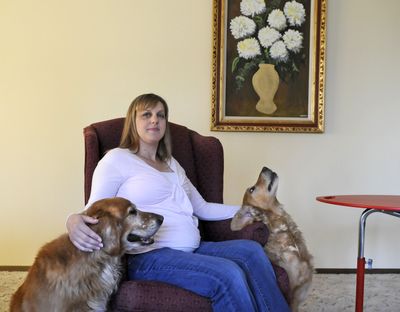Baby could fall through hole in safety net

When Michelle Casey received the first ultrasound of her second pregnancy, she got some unexpected news.
Her daughter had a bilateral cleft lip and palate. The ultrasound technician reassured her, “Oh, yeah, one or two surgeries at Shriners (children’s hospital) and you’ll be good.”
The next day, her obstetrician told her she’d be able to breastfeed.
Wrong, wrong and wrong. It was only after Casey met with Laurie Vessey, a public health nurse with the Spokane Regional Health District, that she learned Shriners doesn’t handle cleft cases, that her daughter would not be able to breastfeed, and that her daughter would need four surgeries in her first year alone.
“Every physician we’ve spoken to, whenever we ask questions – even before we ask questions, actually – they say, ‘Have you talked with Laurie Vessey?’ ” said Casey.
But Casey and hundreds of other parents of children with cleft lip and palate probably won’t be talking with Laurie Vessey much longer. The district is eliminating the program Vessey coordinates, the Maxillofacial Team, as part of an 8.7 percent budget cut that includes the elimination of programs for kids with special health care needs.
By the time Casey’s daughter is born in December, she’ll be joining a different kind of Spokane County – one that no longer helps families coordinate the massively complex series of surgeries, health concerns, decisions and misinformation involved with cleft programs. It is one of so many publicly funded programs being cut or changed these days, it’s almost redundant to mention it.
But cut by cut, it’s important to remember these changes are not mere rhetorical exercises.
“Budgets are tight, and it’s everywhere,” said Vessey, a public health nurse for nearly 20 years who will be reassigned if the cuts are finalized. “It seems that not only the health district but a lot of supportive services these days are being pulled from very young children and women. … Compared to what things looked like 20 years ago, there are really no safety nets.”
There is debate about the wisdom of this particular cut. With a budget of $170,000 a year, it’s not hard for people to select other savings they believe would make more sense. The district says it’s cutting the program because it simply has less money each year and must make difficult choices among its 30-some public health programs.
“It’s heartbreaking for us,” district spokeswoman Kim Papich said. “We have a lot of sympathy for the parents.”
There is a squeaky-wheel element to this. Parents involved in the program have been well-organized and savvy. Four years ago, when the state proposed cutting its funding for the program, parents organized, lobbied, went to the media and fought successfully to save it.
It’s hard to imagine, say, heroin addicts relying on the methadone program to do the same. But we need to treat opiate addicts. And people with HIV/AIDS. And and and and. If there is a discouraging note in the parents’ activism for the cleft program it is this one: An argument from some that their innocent children deserve the money more than drug addicts or people with AIDS.
But hey – that’s who we are now. We’ll never raise a tax, not on candy or millionaires or face lifts, and we’ll let the kids with birth defects fight it out with pregnant drug addicts to see who’s more deserving.
The current budget proposal – including overall cuts of $2 million and a reduction in staff of nearly 8 percent – was announced just three weeks ago, and parents felt blindsided. Though Papich said the district undertook a rigorous evaluation of programs, there wasn’t any public discussion until parents pressed for a meeting, at which the cuts were presented as a fait accompli.
“I think if you are going to end a program like this that’s been with the health district for 41 years, it probably shouldn’t be done suddenly, for the sake of the kids and continuity of coverage,” Vessey said.
So, I asked Spokane’s top expert on cleft lip and palate, is this being done too abruptly?
“I’ve only known about it for 10 days,” she said. “The vote’s on Thursday.”
The coordination of care for children with cleft lip and palate is an immense task. It’s the No. 1 birth defect in the country, and Spokane County typically has a higher-than-average incidence of it. Children with the condition face decades of surgeries and medical care to address problems with eating and nutrition, breathing, speech and hearing, appearance and many others. Vessey’s program coordinates a team of surgeons, doctors and other specialists for families in 11 Eastern Washington counties.
“There’s so much involved that people just have no idea,” said Kari Almeida, the director of a local network of parents of children with cleft lip and palate. “My son sees eight different doctors.”
Could someone else in the community pick up the program? On the face of it, it doesn’t seem so impossible that a hospital might do it – but no one’s lined up to volunteer just yet.
Meanwhile, Michelle Casey is due Dec. 5. If the budget proposal is adopted, she and her daughter will get initial visits from Vessey right after birth.
“Then, after the 31st,” she said, “it’ll be cut off.”